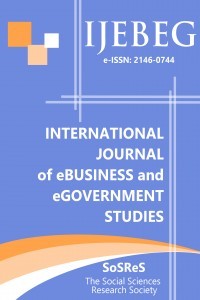WOMEN EXCLUDED OR EMPOWERED? A CASE FOR DIGITAL LOCAL AGENDA IN EUROPE
WOMEN EXCLUDED OR EMPOWERED? A CASE FOR DIGITAL LOCAL AGENDA IN EUROPE
The paper explores the issue of eInclusion of all into eGovernment services with the help of Digital Local Agenda (DLA). Information and Communication Technologies are essential for today’s society and economy; however, the problem of exclusion of various groups from the emerging digital society – the digital divide – persists. The paper explores causes for the digital gap focusing primarily on exclusion of women. Exclusion of this group is brought into focus in particular because women represent roughly half of the population. Solutions to the problem are then explored noting that many experts look to DLA as being one of the remedies, since it is designed to be customized to local conditions. This paper therefore explores the option of DLA as a solution, providing the reader with several examples of the Agenda being applied. The paper concludes that DLA seems to be effective in a number of settings and should be taken into consideration when policies to close digital divides are being devised
Keywords:
Digital Divide, Digital Gap, Digital Local Agenda (DLA), eGovernment eInclusion, Gender Digital Divide,
___
- Council of the EU (2001), “Council Resolution of 8 October 2001 on ‘e-Inclusion’ – exploiting the opportunities of the information society for social inclusion,” Official Journal of the European
- Communities, (2001/C 29 2/02), 18.10. 2001, pp. 6-8.
- Dvořáková, M. (2007), “Zpět do práce“, (in: L. Sokačová-Ed., Informační Technologie – Prostor pro Ženy,) Prague: Gender Studies o.p.s. a Síť MC v ČR, pp. 53-54.
- European Commission (2002), eEurope 2005: An information society for all, COM(2002) 263 final, Brussels, http://ec.europa.eu/information_society/eeurope/2002/news_library/documents/eeurope2005/eeuro pe2005_en.pdf, [Accessed 14.2. 2011].
- European Commission (2005), i2010 – A European Information Society for growth and employment, COM(2005) 229 final, 1.6. 2005, Brussels.
- European Commission (2006), i2010 eGovernment Action Plan: Accelerating eGovernment in
- Europe for the Benefit of All, COM(2006) 173 final, Brussels, http://eur- lex.europa.eu/LexUriServ/LexUriServ.do?uri=COM:2006:0173:FIN:EN:PDF, [Accessed 23.1.
- European Commission (2009), Commission Staff Working Document – Better access for rural areas to modern ICT, COM(2009)103, Brussels, http://ec.europa.eu/agriculture/rurdev/employment/ict/sec2009_254_en.pdf, [Accessed 1.3. 2011].
- European Commission (2010a), A Digital Agenda for Europe, COM(2010) 245 final/2, Brussels, http://eur-lex.europa.eu/LexUriServ/LexUriServ.do?uri=COM:2010:0245:FIN:EN:PDF, Accessed 2.3. 2011].
- European Commission (2010b), Europe 2020 – A European strategy for smart, sustainable and inclusive growth, COM (2010) 2020, 3.3. 2010, Brussels.
- Guntherova, E. (2009), “Žena v informační společnosti: Část II: Žena (ne)gramotná,” Inflow –
- Information Journal, Vol. 2, no. 2, http://www.inflow.cz, [Accessed 12.12. 2010].
- Inclusive eGovernment ad hoc group and European Commission (2006), A roadmap for Inclusive eGovernment: towards making all citizens, and especially disadvantaged groups major beneficiaries of eGovernment, http://www.umic.pt/images/stories/publicacoes/inclusive_egovernment_roadmap.pdf, Accessed 14.1. 2011].
- Mateřské centrum Dobříšek (2008), Projekt „Zpět do práce“- Závěrečná zpráva, www.mc.dobris.net/kurzy.htm [Accessed 14.12. 2010].
- Misuraca,G., D. Broster, C. Centeno (2010), “Envisioning Digital Europe 2030: Scenario design on ICT for governance and policy modelling,” Paper in proceedings of the 4th International
- Conference on Theory and Practice of Electronic Governance (ICEGOV2010), ACM Press, pp. – 356.
- OECD (2003), ICT and Economic Growth – Evidence from OECD Countries, Industries and Firms, France: OECD Publications.
- OECD (2007), ICTs and Gender, DSTI/ICCP/IE(2006)9/FINAL, http://www.oecd.org/dataoecd/16/33/38332121.pdf , [Accessed 24.1. 2011].
- Ossandon, J. (2008), “Towards a European Model of the Digital Local Agenda,” Paper presented in EISCO 2008 Conference 5th session.
- UN Department of Economic and Social Affairs, “Chpt. 23, Section III: Strengthening the role of Major Groups,” Agenda 21, http://www.un.org/esa/dsd/agenda21/res_agenda21_00.shtml, Accessed 12.1. 2011].
- Başlangıç: 2009
- Yayıncı: Sosyal Bilimler Araştırmaları Derneği
Sayıdaki Diğer Makaleler
DOES INFORMATION TECHNOLOGY CAPABILITY IMPROVE BANK PERFORMANCE? EVIDENCE FROM TURKEY
WOMEN EXCLUDED OR EMPOWERED? A CASE FOR DIGITAL LOCAL AGENDA IN EUROPE
INTEGRATION OF TURKISH EID WITH E-GOVERNMENT & E-BUSINESS SERVICES
Oktay ADALİER, Mucahit MUTLUGUN, Ahmet Fatih MUSTACOGLU
INTERNET MARKETING IN THE PUBLIC SECTOR: THE CASE OF INVESTMENT PROMOTION AGENCIES
İddi MAKOMBE, Muhajir KACHWAMBA
İhsan Tolga MEDENİ, Tunc MEDENİ, Mehmet TOLUN
SOPHISTICATION OF E-SERVICES IN TURKISH PROVINCIAL MUNICIPALITIES: RECENT STATUS
THE EFFECTS OF E-COMMERCE ON SUPPLY CHAIN IN TURKEY
